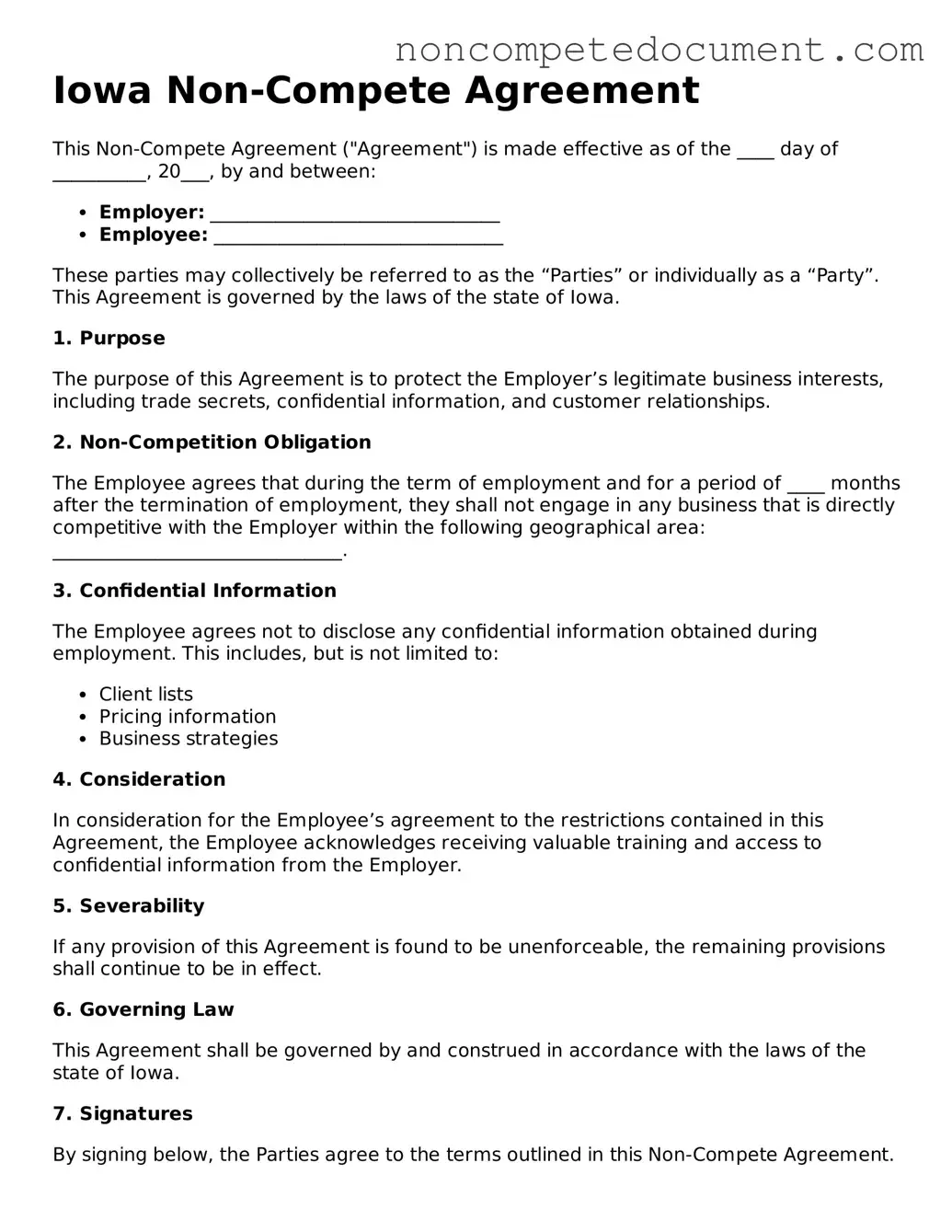Fillable Iowa Non-compete Agreement Template
The Iowa Non-compete Agreement form serves as a critical tool for employers and employees navigating the complexities of employment relationships. This document outlines the terms under which an employee agrees not to engage in certain competitive activities after leaving their job. Typically, it includes essential elements such as the duration of the restriction, the geographic area covered, and the specific activities that are prohibited. By clearly defining these parameters, the form aims to protect the employer's business interests while also providing clarity to the employee about their post-employment options. It is important to ensure that the terms of the agreement are reasonable and enforceable under Iowa law, as overly restrictive agreements may be challenged in court. Understanding the nuances of this form can help both parties make informed decisions and foster a fair working environment.
Common mistakes
When filling out the Iowa Non-compete Agreement form, one common mistake people make is failing to clearly define the scope of the agreement. This includes not specifying the type of work or industry the agreement covers. A vague description can lead to misunderstandings later on. It’s essential to be precise about what activities are restricted to avoid confusion.
Another frequent error involves neglecting to include the geographical area where the non-compete applies. Without a defined location, the agreement may be considered overly broad and unenforceable. It’s crucial to outline specific regions or distances to ensure that the terms are reasonable and legally sound.
Many individuals also overlook the duration of the non-compete period. Some may choose a timeframe that is either too short or excessively long. A reasonable duration is important, as it needs to balance the interests of the employer while still being fair to the employee. A well-thought-out time frame can help prevent future disputes.
Finally, a mistake that often occurs is not having the agreement reviewed by a legal professional. While it might seem like an unnecessary step, legal advice can help identify potential pitfalls and ensure the agreement complies with Iowa laws. Taking the time to consult with an attorney can save both parties from complications down the road.
Dos and Don'ts
When filling out the Iowa Non-compete Agreement form, it’s important to approach the task carefully. Here’s a list of things you should and shouldn’t do:
- Do read the entire form thoroughly before filling it out.
- Do ensure all your personal information is accurate and complete.
- Do understand the terms of the non-compete before signing.
- Do consider consulting a legal professional for guidance.
- Don’t rush through the form; take your time to avoid mistakes.
- Don’t leave any sections blank unless instructed to do so.
- Don’t sign the agreement without fully understanding its implications.
- Don’t assume that verbal agreements are sufficient; everything should be in writing.
More Non-compete Agreement State Forms
How to Get Around a Non Compete - Legal considerations must be accounted for, ensuring the agreement complies with state laws.
Non Solicitation Agreement Illinois - It is essential for both employers and employees to keep a copy of the signed agreement.
Misconceptions
Non-compete agreements are often misunderstood. Here are nine common misconceptions about the Iowa Non-compete Agreement form:
- Non-compete agreements are always enforceable. While many non-compete agreements are enforceable, they must meet specific criteria. Courts may invalidate agreements that are overly broad or unreasonable in duration or geographic scope.
- Signing a non-compete means you cannot work in your field again. A non-compete may restrict employment for a certain period or within a specific area, but it does not permanently bar someone from working in their profession.
- All employees must sign a non-compete agreement. Not all employees are required to sign these agreements. Typically, they are more common for employees in sensitive positions or those with access to proprietary information.
- Non-compete agreements are the same as non-disclosure agreements. These two types of agreements serve different purposes. A non-disclosure agreement protects confidential information, while a non-compete restricts employment opportunities after leaving a job.
- Once signed, a non-compete cannot be changed. Non-compete agreements can be modified if both parties agree to the changes. It is essential to document any modifications in writing.
- Employers can enforce non-compete agreements without any limitations. Employers must demonstrate that the restrictions are reasonable and necessary to protect legitimate business interests. Courts will assess the fairness of the terms.
- Non-compete agreements are only for high-level employees. While they are more common among executives, non-compete agreements can also apply to lower-level employees, depending on the nature of the job and the employer's needs.
- All states have the same rules regarding non-compete agreements. Non-compete laws vary significantly from state to state. Iowa has its own specific regulations that may differ from those in other states.
- Once you leave a job, the non-compete is no longer relevant. A non-compete agreement remains in effect for the duration specified in the contract, even after employment has ended. Violating it can lead to legal consequences.
Key takeaways
When dealing with the Iowa Non-compete Agreement form, there are several important points to keep in mind. Understanding these key takeaways can help ensure that the agreement is filled out correctly and used effectively.
- Understand the Purpose: A non-compete agreement is designed to protect a business's interests by preventing employees from working for competitors or starting a competing business for a specified period after leaving the company.
- Know the Limitations: In Iowa, non-compete agreements must be reasonable in duration, geographic scope, and the type of work restricted. Courts may not enforce agreements that are overly broad.
- Consider Employee Rights: Employees should be aware of their rights. Non-compete agreements should not unfairly restrict an individual's ability to find work in their field.
- Seek Legal Guidance: It is advisable for both employers and employees to consult with a legal professional when drafting or signing a non-compete agreement to ensure that it is fair and enforceable.
